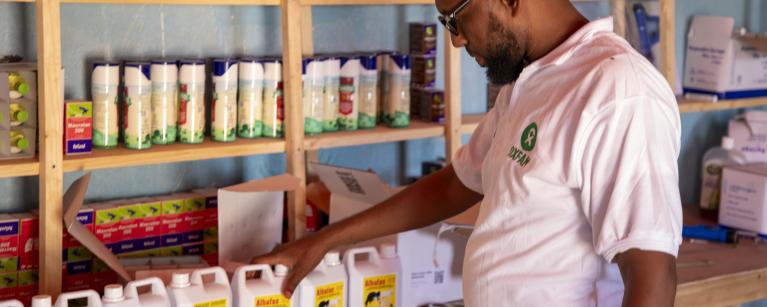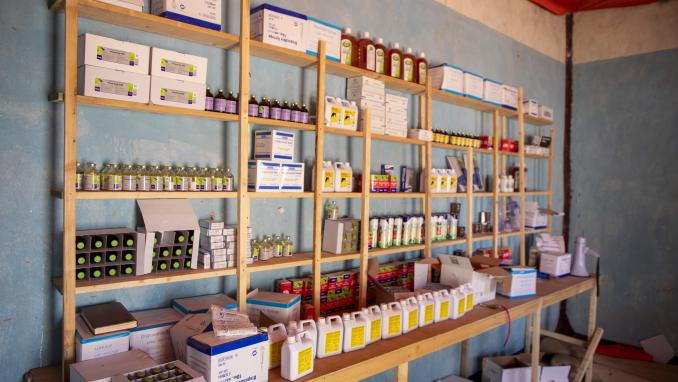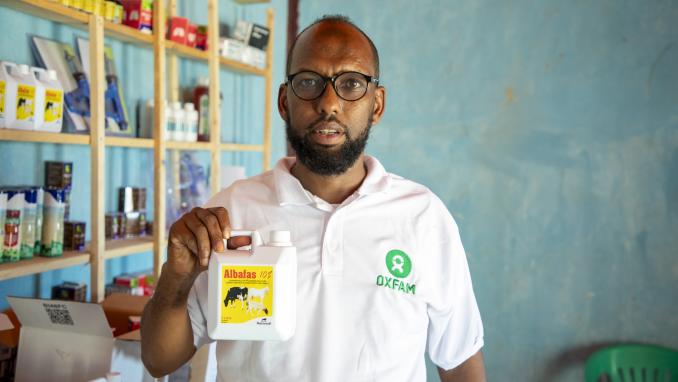“The goal is to provide immediate access to veterinary drugs and skills. It's about empowering our people to care for their livestock effectively.”
By Abdiaziz Adani
Meet Mustafa Hassan Ahmed, a dedicated resilient project coordinator for the ICSP (Integrated Community Support Program) With a glimmer of pride in his eyes, Mustafa gestures towards a small, well-stocked shop in Wadamagoo. "This," he explains, "is more than just a veterinary shop. It's a lifeline for our community."
Wadamagoo is a crucial hub for livestock in the region. Herds of goats, sheep, and camels converge here, drawn by one of the few reliable water sources in the area. During the unforgiving dry season, thousands of animals depend on this precious water supply. But water alone isn't enough to keep the livestock healthy and the community thriving.
That's where Oxfam's project comes in. By establishing several veterinary shops in strategic locations, Oxfam brought vital medical care right to the heart of these pastoral communities. "The goal," Mustafa explains, "is to provide immediate access to veterinary drugs and skills. It's about empowering our people to care for their livestock effectively."
Inside one of these shops, we meet Keyse Aden a pharmacist whose life has been transformed by the project. "Oxfam didn't just set up these pharmacies," he shares, his voice filled with gratitude. "They provided us with medicines, built shelves, and gave us the tools we needed to succeed." His eyes scan the neatly arranged shelves stocked with various medications. "We offer treatments for respiratory diseases, skin conditions, and so much more. It's not just about selling medicine; it's about serving our community."
The impact of these veterinary shops ripples through the community. An estimated 1,000 households – that's about 6,000 people – now have access to treatment drugs for their livestock. This access has led to a significant reduction in livestock mortality rates, a change that can mean the difference between prosperity and poverty for many families.
But the benefits don't stop there. The project has created jobs and supported approximately 40 Community Animal Health Workers (CAHWs) in the target areas and surrounding villages. These dedicated individuals can now replenish their veterinary kits locally, a simple change that has dramatically expanded their reach.
"Before," Keyse Aden explains, "CAHWs had to travel over 100 kilometers to Buro town just to buy drugs. Now, they can get what they need right here. It means they can serve more people, reach more remote areas."
As the project's impact becomes increasingly evident in Wadamagoo, it's clear that its significance extends beyond improving livestock health and veterinary care access. The initiative has fostered a sense of empowerment and security within the community. It has provided individuals like Keyse and the local pharmacist with the necessary resources to actively contribute to their community's development and shape its future.
"Ninety percent of the medicines we receive go directly to serving our local community," the pharmacist says with a smile. "We're not just running a business; we're sustaining a lifeline. The greatest benefit always goes to our people, to our herders."
This project, funded by Irish Aid and implemented by Oxfam in collaboration with local partner Candlelight, has had a substantial impact. So far, it has reached a total of 32,400 people, including 8,424 men, 10,368 women, 6,480 boys, and 7,128 girls. Additionally, there has been an indirect reach of 8,822 individuals across the project's target sites.
By providing accessible veterinary care, these shops are not just treating animals; they're preserving livelihoods, strengthening food security, and building resilience in communities vulnerable to drought and other challenges. For the pastoral communities of Somaliland, these humble veterinary shops represent hope and a path to a more secure future.


